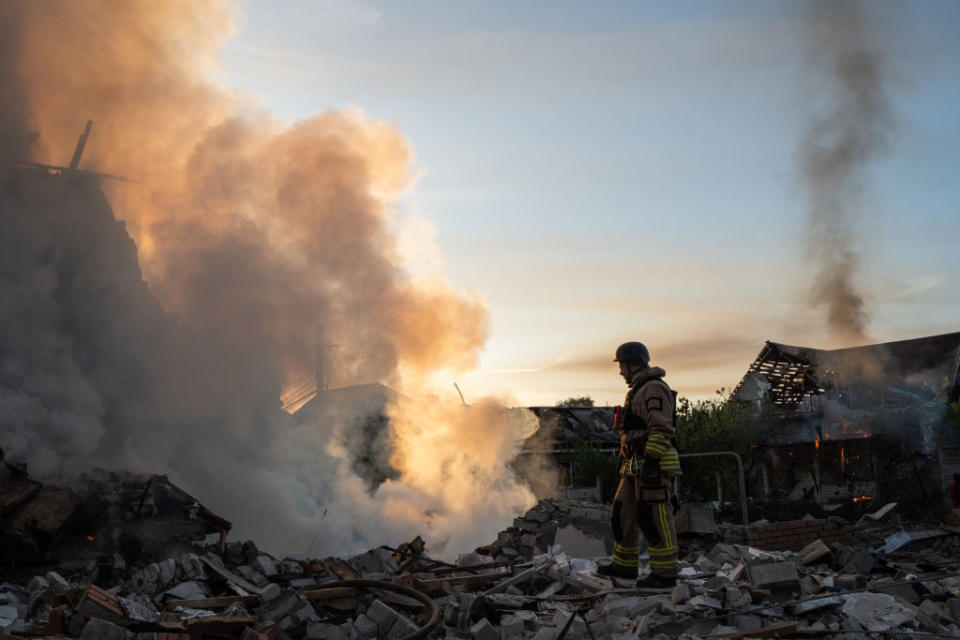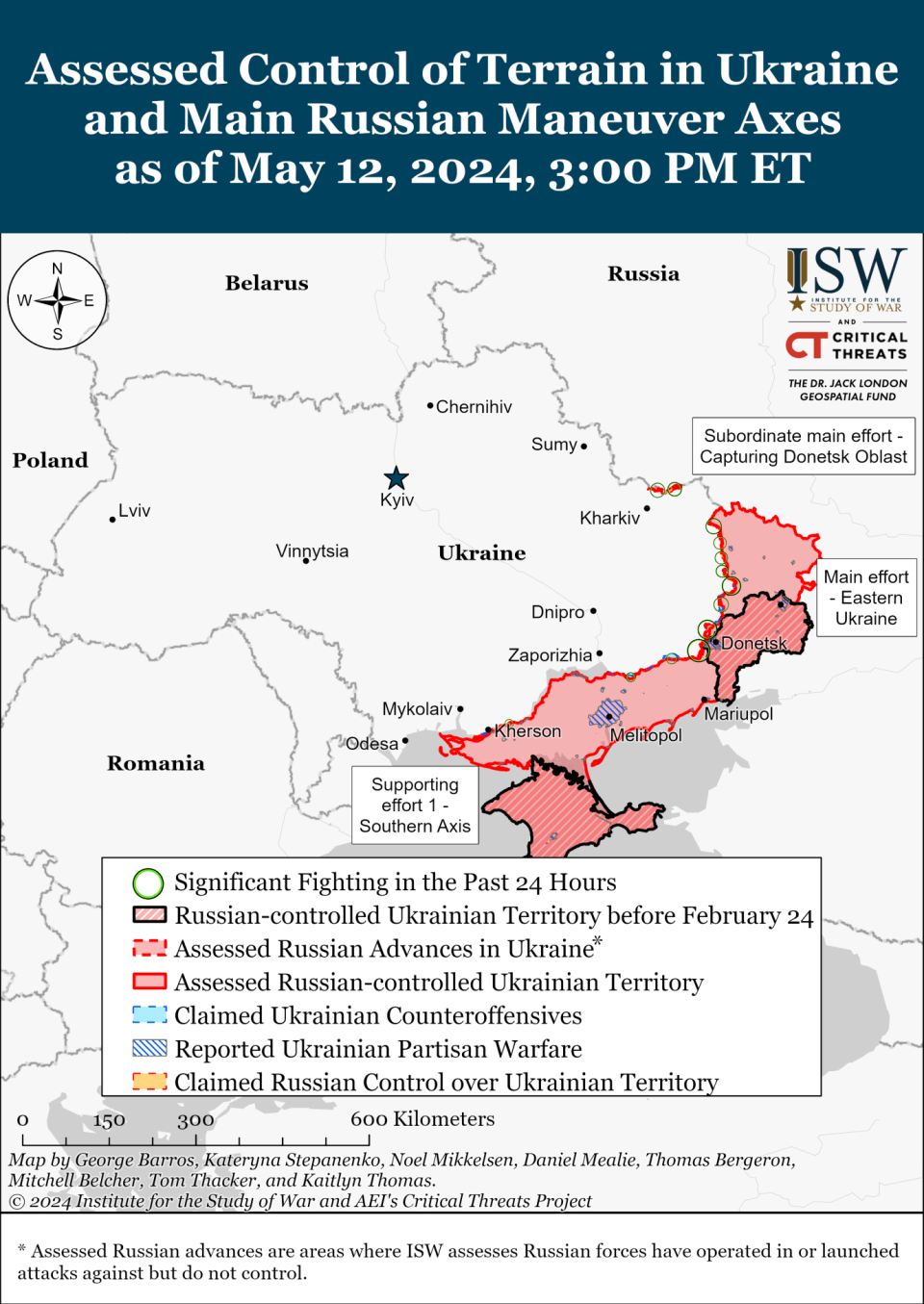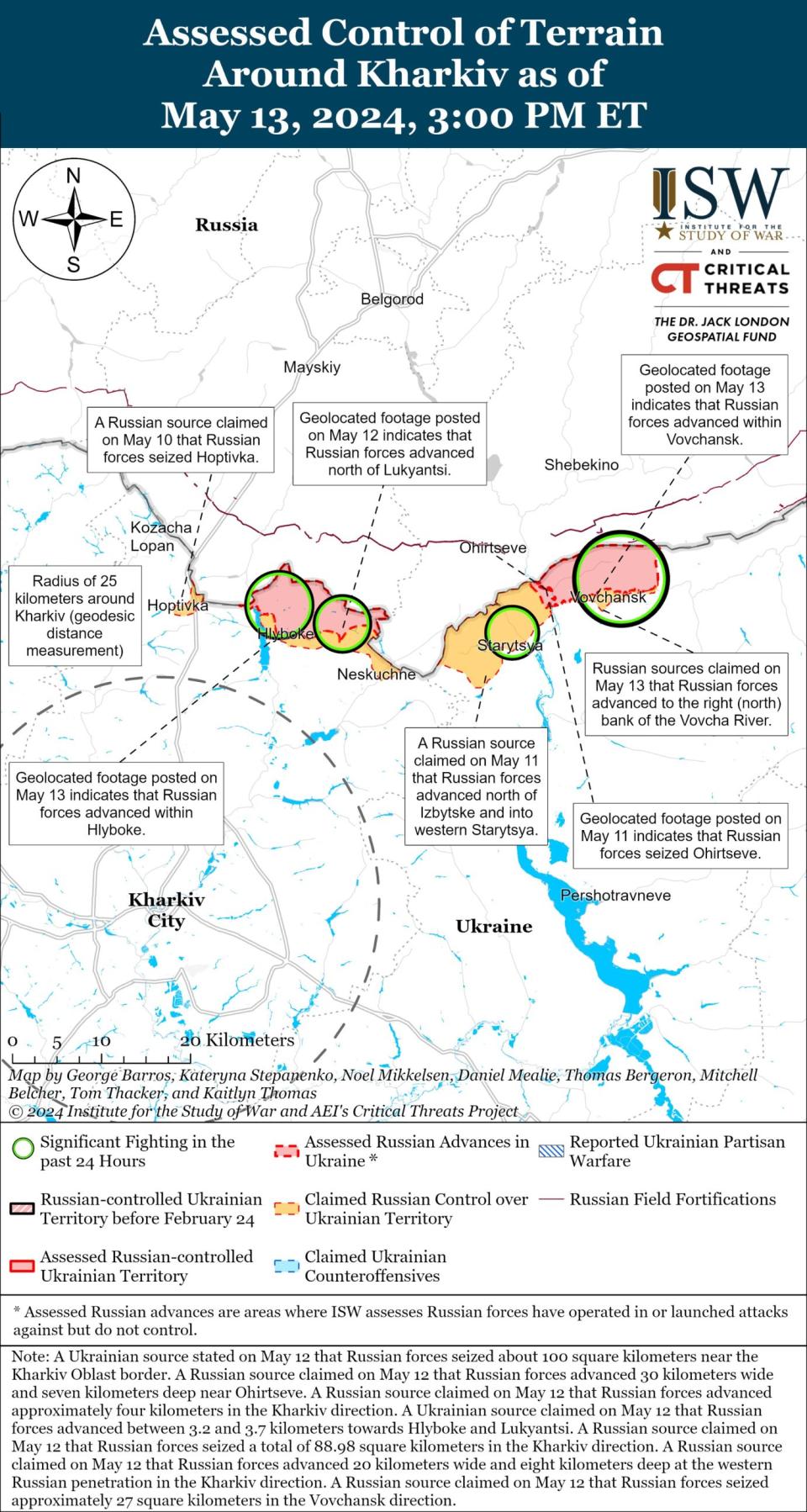Russia Opens Up New Front in Northeastern Ukraine
- Oops!Something went wrong.Please try again later.
- Oops!Something went wrong.Please try again later.
From the The Morning Dispatch on The Dispatch

Happy Tuesday! To the powers that be at The Dispatch, consider this our official request to relocate the office to William F. Buckley’s eight-bedroom childhood home in Sharon, Connecticut, on the market for a cool $5.5 million.
Quick Hits: Today’s Top Stories
Secretary of State Antony Blinken arrived in Kyiv on Tuesday morning local time in a show of support for Ukraine as the country’s troops battle invading Russian forces on a new front in the northeast. According to State Department spokesman Matthew Miller, Blinken will meet with Ukrainian President Volodymyr Zelensky to discuss “battlefield updates, the impact of new U.S. security and economic assistance, long-term security and other commitments, and ongoing work to bolster Ukraine’s economic recovery.”
Prosecutors in the United Kingdom charged three men on Monday with spying on behalf of the Hong Kong intelligence service in violation of the U.K.’s National Security Act, alleging the men broke into a U.K. residence on May 1. Hong Kong is a special administrative region of China, and Chinese authorities have denied any involvement on the part of Hong Kong’s intelligence agency. Last week, U.K. officials expelled a Russian diplomat accused of spying, though the cases are not believed to be related.
The Federal Energy Regulatory Commission (FERC), which oversees interstate electricity transmission, issued two new rules on Monday aimed at expanding green energy. One requires utility companies to make plans for energy supply and demand—including planning for potential disruptions due to extreme weather—over at least two decades, and another gives FERC the authority to grant permits to long-distance power lines, which could allow wind and solar energy produced primarily in the Southwest to move efficiently to urban areas.
Several major U.S. airlines sued the Department of Transportation on Monday over a rule that requires greater transparency from airlines about the fees they charge passengers. The airlines, including United, Delta, and American Airlines, say the Biden administration is overstepping its authority with the rule and that it “will greatly confuse consumers who will be inundated with information that will only serve to complicate the buying process.”
Michael Cohen, once a fixer for former President Donald Trump, took the stand on Monday in Trump’s New York criminal trial. Cohen, the prosecution’s star witness, directly implicated Trump in his payments to adult film actress Stormy Daniels and others and testified that the then-presidential candidate was primarily concerned about how news of his affair with Daniels would affect his electoral prospects. Cohen testified that Trump wanted the relationship kept quiet until after the 2016 election. “If I win, it will have no relevance because I’m president,” Cohen recalled Trump saying. “And if I lose, I don’t even care.” Cohen will retake the stand Tuesday for the prosecution before facing cross-examination from Trump’s lawyers, who are likely to try to impugn his credibility.
Russia Goes on the Offensive in Kharkiv

When Russia opened a new front in northeastern Ukraine on Friday, thousands of Ukrainians were faced with a wrenching choice: Leave, or risk their lives to stay in their homes. “If I am needed here, then may God protect me here,” one resident told the Kyiv Independent. “And [if] he needs me up there, let him take me as long as it doesn’t hurt.”
Some 6,000 civilians have made the choice to flee as their villages were, in the words of Ukrainian President Volodymyr Zelensky, “turned from a gray zone into a combat zone.” Russian attacks on the Kharkiv region continued through the weekend, opening another front in the war and potentially marking the start of a large Russian summer offensive against Ukraine. The new front, though not yet the site of a major incursion, will stretch Ukrainian forces as the country waits for U.S. aid to catch up after a months-long pause in arms shipments.
The northern part of the front has remained more or less stable since Ukraine’s counteroffensive began in the fall of 2022, with fighting instead concentrated in eastern and southeastern Ukraine. But over the weekend, Russia launched a cross-border attack in northern Kharkiv, opening up a new combat line separated from the rest of the fighting.

Russian forces kicked off a two-pronged attack on Friday, starting with a heavy bombardment of the region—targeting cities and villages just across the border—and followed by advancing personnel and tanks focused on the city of Volchansk and villages between the border and Kharkiv, the second-largest city in Ukraine and only 18 miles from the Russian border. Ukrainian officials said on Monday that 30,000 Russian soldiers are involved in the Kharkiv offensive, and Russia has reportedly taken several border villages and towns, including Hlyboke, Ohirtseve, and Starytsya, among others. Ukraine’s general staff of the armed forces said yesterday that Russian forces have “partially succeeded” in the village of Lukiantsi.

As of Monday night, heavy fighting continued on the outskirts of Vovchansk, just three miles from the border. Russian forces claimed to have taken control of the town, but the Ukrainian military said its troops had launched counterattacks and retained control. “The situation is on the edge,” Gen. Kyrylo Budanov, the head of Ukraine’s military intelligence agency, said on Monday. “Every hour this situation moves toward critical.” The closest reinforcements, according to Budanov, are in Chasiv Yar—120 miles south—and could take days to redeploy. “I’ve used everything we have,” he said of the forces in Kharkiv. “Unfortunately, we don’t have anyone else in the reserves.”
Ukraine lowered the military conscription age in April to address its troop shortage, but the front lines won’t see the fresh recruits for some time. “Mobilization still doesn’t kick in for a few weeks, and cannot come at a moment too soon,” Dmitri Alperovitch, chairman of the Silverado Policy Accelerator, told TMD. “They’ve got to train those forces before they send them to the front, obviously, and right now they’re outmanned and outgunned.”
Denys Yaroslavskyi, a Ukrainian reconnaissance commander, told the BBC on Sunday that inadequate preparation enabled the Russian advance across the border. “There was no first line of defense,” he said. “The Russians just walked in. They just walked in, without any mined fields.” Ukrainian President Volodymyr Zelensky announced on Monday that he had replaced the commander in the Kharkiv region.
Despite the disparity between the two forces, it’s not yet clear that Russia has committed sufficient troops for a successful assault on Kharkiv city. “The operation could set conditions for a major offensive operation that seeks to seize Kharkiv City, though Russian forces’ current limited efforts do not suggest that Russian forces are immediately pursuing a large-scale sweeping offensive operation to envelop, encircle, or seize Kharkiv City,” George Barros—the Geospatial Intelligence Team Lead at the Institute for the Study of War, a Washington a think tank that tracks Russian troop movements—wrote yesterday. Russian forces ramped up their strikes Monday along the border in Sumy—a neighboring oblast northwest of Kharkiv—where it’s possible Russia could lengthen its northern border offensive.
Russia seems to be forcing Ukraine to redeploy forces from the south to arrest Russian advances in the northeast. “The enemy is trying to deliberately stretch it [the front line], attacking in small groups, but in new directions, so to speak,” Oleh Syniehubov, the governor of Kharkiv oblast, said on Monday. Zelensky noted yesterday, “We understand the enemy’s actions and their plan to divert our forces.”
Moscow appears to be exploiting the lag in U.S. military aid to Ukraine to make battlefield gains. President Joe Biden signed the $60 billion supplemental aid package for Ukraine into law last month, but the protracted delay in approving the military support has forced Ukrainian troops to ration ammunition, and it will take time for the new supplies to filter through to the front lines. Some re-supply packages have already reached Ukraine—in anticipation of the supplemental passing, U.S. military officials prepositioned aid to move as soon as possible—but other equipment will take months to arrive.
“There’s no doubt there’s been a cost in the months-long delay in getting the supplementary budget request approved and the equipment sent out to Ukraine,” Secretary of State Antony Blinken, who arrived in Kyiv on Tuesday morning, said on Sunday. “We’re doing everything we can to rush this assistance out there.” On Friday, the Pentagon announced a $400 million tranche of military aid to Ukraine that includes artillery shells, rockets, and air defense munitions.
“The really helpful package is the weapons brought to Ukraine,” Zelensky said on Friday. “Not just the announcement of the package.”
Some troops defending Kharkiv have explicitly blamed the Russian gains on the lack of arms. “If we had the weapons we should have—even if we had five or six self-propelled Howitzers—it could have a big difference,” an unidentified Ukrainian platoon commander told Sky News of the mobile artillery pieces.
Last month, Russian artillery outgunned Ukraine 10 to 1, and the effects of the shortage have also been felt beyond the battlefield. A Wall Street Journal analysis published Monday found that Ukraine has only been intercepting 46 percent of Russian missiles in the last six months, compared to 73 percent in the preceding six months. Russia has leveraged the lack of air defenses by targeting Ukraine’s power grid, and in April, with Ukraine running low on missile defenses, the interception rate was only 30 percent.
But even once the aid arrives, analysts argue U.S. restrictions on Ukraine using weapons to strike inside Russia will continue to give the attackers an advantage in targeting Kharkiv and Ukrainian forces near the border. The U.S. has prohibited Ukraine from using longer-range missiles like the Army Tactical Missile System (ATACMS) to hit targets in Russia. As former GOP Sen. Rob Portman of Ohio argued in a piece for the site last week:
“The [Biden] administration currently places onerous conditions on their use out of concern of escalation. British Foreign Minister David Cameron’s recent announcement that the United Kingdom would allow Ukraine to use UK-supplied long-range Storm Shadow missiles against Russian territory is a welcome development, and the U.S. should follow it. Russia has attacked Ukraine from Russian territory since Day 1. The administration must allow Ukraine to defend itself.
In recent months, Russian forces have increasingly relied on glide bombs—Soviet-era bombs outfitted with GPS and glider wings—that can fly for up to 40 miles after being dropped from Russian aircraft, allowing pilots to strike Ukrainian targets from Russian airspace. Ukraine does not have enough of its non-U.S. air defense systems to counter Russian aircraft while in Russian airspace.
Ukrainian pilots could use F-16s to counter the bombers, but the first jets aren’t expected to reach Ukraine until this summer. “Ukraine needs more Patriot systems and interceptors,” Barros argued, “but no number of Patriot systems can protect Kharkiv City from the Russian glide bomb threat so long as the Russian Air Force can continue to use Russian airspace as a sanctuary and safe space.” He also noted that Ukraine’s limited ability to strike inside Russia beyond artillery range has enabled Russian forces to safely amass troops for the Kharkiv offensive.
For now, it’s a race against time to resupply and reinforce Ukrainian positions while troops try to hold off the Russian offensive as best they can. “Our task is crystal clear—to thwart Russia’s attempt to expand the war,” Zelensky said on Monday. “The fulfillment of this task depends literally on everyone who is on the ground—from Chernihiv to Volchansk, from Kharkiv to Donetsk.”
Worth Your Time
We wrote to you several weeks ago about the United Kingdom’s Cass Review, which examined the evidence around gender-transition treatment for minors and concluded that “for most young people, a medical pathway will not be the best way to manage their gender-related distress.” This week, Dr. Hilary Cass herself spoke to the New York Times’ Azeen Ghorayshi about the effect of her report in her own country and across the pond. “It wouldn’t be too much of a problem if people were saying ‘This is clinical consensus and we’re not sure,’” Cass said of American medical associations’ dismissal of her report, which suggested there was “remarkably weak” evidence on the effects of hormone treatments for young people. “But what some organizations are doing is doubling down on saying the evidence is good. And I think that’s where you’re misleading the public. You need to be honest about the strength of the evidence and say what you’re going to do to improve it. I suspect that the [American Academy of Pediatrics], which is an organization that does massive good for children worldwide, and I see as a fairly left-leaning organization, is fearful of making any moves that might jeopardize trans health care right now. And I wonder whether, if they weren’t feeling under such political duress, they would be able to be more nuanced, to say that multiple truths exist in this space—that there are children who are going to need medical treatment, and that there are other children who are going to resolve their distress in different ways.”
It sounds like something out of an episode of a sci-fi television show: mining asteroids for their cosmic riches. But as Sarah Scoles reported for Undark magazine, it could soon be reality. “In April 2023, a satellite the size of a microwave launched to space,” she wrote. “Its goal: to get ready to mine asteroids. While the mission, courtesy of a company called AstroForge, ran into problems, it’s part of a new wave of would-be asteroid miners hoping to cash in on cosmic resources. Potential applications of space-mined material abound: Asteroids contain metals like platinum and cobalt, which are used in electronics and electric vehicle batteries, respectively. … The pull of space rocks remains powerful and the new crop of companies hopeful. The economic picture has improved with the cost of rocket launches decreasing, as has the regulatory environment, with countries creating laws specifically allowing space mining. But only time will tell if this decade’s prospectors will cash in where others have drilled into the red or be buried by their business plans.”
Presented Without Comment
Axios: ‘Kick That F**king Door Down,’ [Vice President Kamala] Harris Says During AAPI Event
“Sometimes people will open the door for you and leave it open,” she said. “Sometimes they won’t. And then you need to kick that f–king door down.”
Also Presented Without Comment
Yahoo Finance: GameStop Stock Soars Over 70% as ‘Roaring Kitty’ Revival Reignites Meme-Stock Bonanza
In the Zeitgeist
It’s graduation season! Graduates across the country will get a lot of boilerplate—or just downright stupid—advice over the next few weeks as major and minor celebrities opine on the meaning of life in commencement speeches. We think Jerry Seinfeld, in his remarks to the graduates of Duke University, got it right: “Do not lose your sense of humor. … Not enough of life makes sense for you to be able to survive it without humor.”
Toeing the Company Line
In the newsletters: Kevin panned (🔒) a new legislative proposal to “cancel” hundreds of billions of dollars in medical debt, the Dispatch Politics crew checked in on the Maryland Senate race, and Nick argued that (🔒) even the best-case outcome of the presidential election is pretty grim.
On the podcasts: Sarah and David discuss Trump’s New York criminal trial and how the former president might respond to the results of the election on Advisory Opinions.
On the site: Charlotte reports on recent scrutiny of Israel’s military and humanitarian strategy, Chris digs into the latest battleground state polling and what it means for Biden, and Mark Caleb Smith and Emma Blakemore explain the Antisemitism Awareness Act.
Let Us Know
Should the Biden administration lift restrictions on how Ukraine can deploy certain U.S.-supplied weapons?
